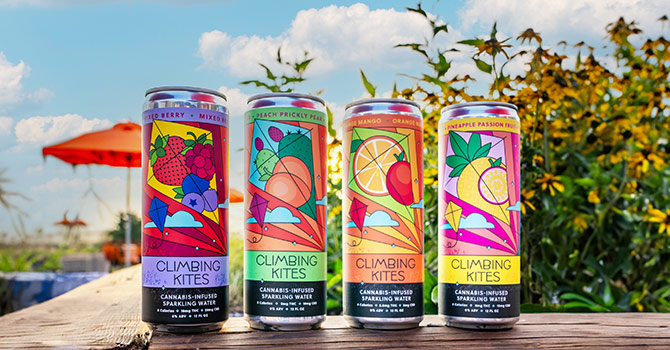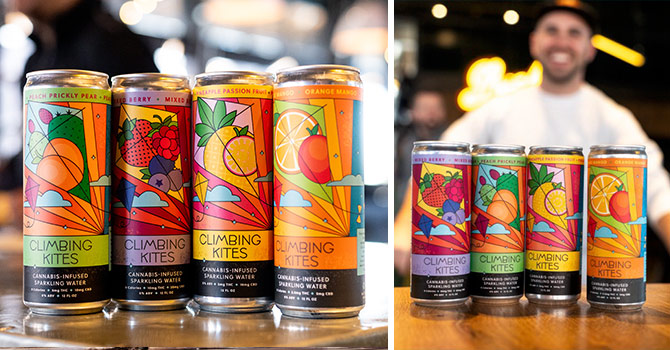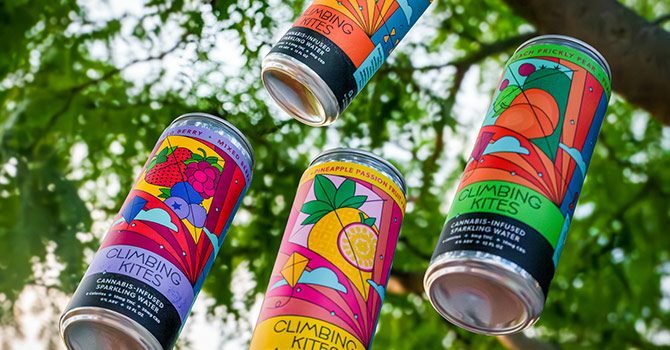Big Grove Brewery has acquired a majority stake in Climbing Kites, an Iowa-based maker of Delta 9 THC- and CBD-infused, non-alcoholic sparkling water.
Iowa City-headquartered Big Grove acquired a 51% stake in the business last September. Financial details were not disclosed. The deal was not made public until now.
Scott and Whitney Selix, founders of Des Moines-based Lua Brewing, and head brewer Zach Dunbar launched Climbing Kites in May.
Climbing Kites was made possible by the 2018 Farm Bill and the Iowa Hemp Act of 2019, which descheduled industrial hemp production, paving the way for the production and sale of cannabis-infused beverages. Climbing Kites’ alcohol-free offerings check in at 2.5 mg, 5 mg, 10 mg, and 15 mg of THC, with varied CBD levels. They are gluten free, vegan and contain no calories or sugar.
Selix told Brewbound that shortly after Climbing Kites launched last May, he and his team realized that “this was bigger than what we could handle as a small, little Iowa brewery.”
“We didn’t have the logistics, the distribution side,” Selix said. “And that was going to be the biggest part of growing this brand.”
So he reached out to Big Grove co-founder Matthew Swift. Selix had started his beer career at Big Grove, and remained friends with Swift. The initial call was about a sales partnership, but Swift suggested they “go all in together,” with Big Grove acquiring a majority stake in the business.
Selix said the 51%-49% split made sense since Big Grove would handle the business-side of Climbing Kites. A deal was finalized in July, with the transaction closing in September.
“They had a first mover advantage that we thought was very important, and to this day is still very important, and we believe in their ability to keep innovating too,” Swift told Brewbound. “For us, could Big Grove have created their THC seltzer? Sure. But I didn’t think that there was enough soul in that, and we wanted to create something that had a little more depth.”
Swift classified the deal as “a partnership.” Lua’s team leads the creative side, while Big Grove’s team handles the business side. And there’s crossover between the teams, with David Moore serving as Climbing Kites’ CEO, as well as Big Grove’s chief growth officer.
Despite the partnership, Lua and Big Grove remain separate operations.
Climbing Kites’ offerings are available in four core flavors: Mixed Berry, Pineapple Passion Fruit, Orange Mango and Peach Prickly Pear. The brand will soon introduce THC-infused Grapefruit Guava and caffeinated Key Lime Kiwi.
Climbing Kites is self-distributed in Iowa and sold in both breweries’ taprooms across the state. The product is also available via direct-to-consumer e-commerce sales in 42 states.
The price point is in line with high-end craft beer, with 4-packs retailing in the $20 range, depending on the milligrams and strength of the THC in the beverage. In the on-premise, a can sells for $7-$9, depending on the strength.
Product consistency has been key for Climbing Kites. The company “extensively” tests each batch to ensure it has the proper level of THC, “so you know exactly what you’re getting,” Selix said.
The difference between Climbing Kites’ offerings and craft beer is the variables, from flavors, to milligrams of strength, to adaptogens, to caffeine, Selix said.
“There’s more potential offerings and just trying to collect data on what consumers really want,” he said.
“Our consumer data is our taprooms and the independent liquor and grocery stores that are supporting us,” Swift added.
Climbing Kites products now account for about 20% of Lua’s taproom sales, Selix shared.
“When I went back and looked at last year’s sales, it wasn’t necessarily that beer went down,” he said. “Beer was pretty stagnant. It was just the growth that we had was almost exclusively Climbing Kites. It was bringing new people in.”
The products are produced at Fair State Brewing Cooperative’s Chill State Collective in St. Paul, Minnesota (Fair State recently filed for Chapter 11 bankruptcy). However, the company is close to finalizing licensing to produce at Big Grove’s Iowa City production facility under contract.
Moore told Brewbound that production across a couple of states helps derisk the business and account for variables such as transferring product and ingredients across state lines, as well as protecting the business should the regulatory environment change.
“We’re pretty mindful of where this product is welcomed,” he said.
Climbing Kites is looking to expand outside of Iowa “relatively soon,” most likely in Illinois and Nebraska, Moore said.
“We want to find the right distribution partners in the right markets,” Swift said. “So we’re not putting any restrictions on it right now. But I think the opportunity is massive.”
Although initial conversations with wholesalers were previously “quiet,” the chatter has picked up more recently, Moore said.
“Distributors are opening their minds a little bit to it,” Selix said. “But I think we’re also forcing them to take notice.”
Taking Climbing Kites Higher
Selix admitted that retail adoption has been the biggest hurdle thus far for scaling Climbing Kites.
“It’s a new product, it’s a new space, there are stores who are nervous, especially early on,” he said. “One of our bigger challenges was convincing stores that this is a viable product, showing them that it’s legal and getting buy-in.”
Independent retailers have been among the early adopters and helped with “proof of concept,” Selix said.
The next step is adoption by the larger chain retailers, such as HyVee grocery stores and Casey’s convenience stores, Moore said.
“You look at Minnesota, it’s become way more prevalent,” he said. “They’re a couple of years ahead of the state of Iowa.”
Moore added that the on-premise has been “a huge success” thus far. Sampling in the taprooms has also helped with consumer adoption, education and acceptance.
Swift believes the brand has the potential to be a “national play,” but the company will benefit with regional expansion.
Swift and Selix see the brand as a way to include consumers who aren’t interested in craft beer. As a craft beer alternative, Climbing Kites still offers drinkers an experience, the ability to feel something and also be social, Selix added.
“This is a non-alcoholic option where you feel like you’re a part of our drinking culture or the culture we’ve set up with a can-in-hand,” Selix added. “It fits into life as we are now and that’s where the huge opportunity is.”



